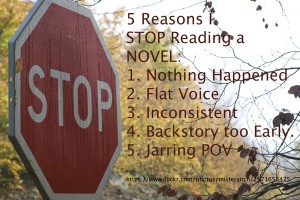Openings are incredibly important. This was brought back to me recently as I was judging a contest. Those manuscripts that kept my interest for three pages were rare. Usually, they lost me by the middle of page two!
Am I harsh? I don’t think so.
Grab the Reader with Your Opening Lines
Noah Lukeman has it right in his book, The First Five Pages: A Writer’s Guide to Staying Out of the Rejection Pile. This is a book I ask those attending my Novel Revision retreats to read before they attend. Lukeman’s premise is that an editor will decide if they want your book or not based on the first five pages of your manuscript. After judging this contest, I agree. Sometimes, you can even make a judgment based on the first paragraph.
That first paragraph? You want to grab the reader by the throat and never let go!
Here are five things that made me stop reading
- Nothing happened. The whole first chapter could be cut, because no major action occurred. Ask yourself: what happened in this chapter? Is there any conflict here?
- The voice was flat. Monotone and uninteresting. Read it aloud: Does the text demand that you use an interesting variation of pitches, tones, stops, starts, etc?
- Inconsistencies. If I found myself thinking, “No, that couldn’t happen. Not that way,” then the story was in trouble. Consider: does the story logic work?
- Backstory. Please don’t put backstory in the first chapter. Give us an active scene with the character in motion and wanting something. It doesn’t have to be the major goal of the book, but the character needs to want something and it should be something that leads into the main conflict. Ask yourself: Do I really need to explain the backstory here, or can I wait until page 100? Yes! Page 100! Move that stuff out of the first act entirely!
- The point-of-view jumps out at me. Too many of the mss had first-person point-of-views that just jumped out at me and made me cringe. In other words, the voice wasn’t distinctive enough for first person. This is a personal opinion–FWIW–but I think too many people are trying to write a first-person narrative. The default should be third-person unless there is a compelling reason for first. It’s not just a bias against first-person, but rather, that the story would be better served from third in many cases.
There were some first-person stories where I didn’t even realize it because the story caught me. When it works, it work well. When it fails, the story might could be salvaged by a switch to third. Consider: Is there a compelling reason for the first-person point-of-view? Could this ONLY be told from first? Try–OK, just try–writing the first chapter from third and give it to an independent, unbiased reader (like you can find that!) and ask which version they like better (don’t tell them what the difference is). I bet that third will win in the majority of cases.

Interesting. Thanks for your suggestions. I think I will run them off. I’ve written two MG novels – one in first person.
I read your book about starting a novel and loved it.I’m ordering Noah Lukeman’s. I met you at a Highlights workshop last year in Honesdale, PA. I’m working on my third novel. All middle grade; 4, 5, 6, ghost stories. My writing coach says the third one is where you really develop a voice. Hopeful. All of your advice is wonderful! Thank you! Karen
So true! It’s especially difficult to get the first person narrator and the backstory parts across to new writers… Soooooo true! I might reference you!
When I did my first read through of my novel, I tried an “action” scene but noticed that it didn’t connect or add to the story in any way. So I’m currently doing a rewrite of that chapter. Like the post!